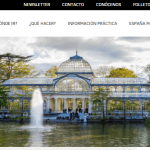Montevideo (Uruguay) is the fifth city in Latin America to be accredited as a Smart Destination, a distinction awarded by the State Society for the Management of Innovation and Tourism Technologies (SEGITTUR), which falls under the Ministry of Industry, Trade and Tourism.
The distinction was presented this afternoon by SEGITTUR’s R&D+I director, Carlos Romero Dexeus, to the mayor of Montevideo in an event attended by the highest representatives of the tourism sector in the Uruguayan capital.
The smart destination model, developed by Spain and endorsed by international organisations such as the World Tourism Organization, the Inter‑American Development Bank, the OECD, the European Commission and the WTTC, is based on 5 key principles (governance, innovation, technology, sustainability and accessibility) and assesses more than 200 criteria.
Governance, axis of Montevideo’s DTI model
The Director of R&D+i at SEGITTUR has praised Montevideo’s commitment to becoming a smart destination, a step that presents major challenges, as well as offering great opportunities for turning the Uruguayan capital into a destination that is not only committed to governance but also to innovation, technology, sustainability and accessibility in its roadmap, as a response to new tourist needs.
Of the five key areas analysed, governance is where Montevideo obtained the best results, particularly those linked to efficient management; this is followed by accessibility, where outstanding management in destination accessibility was recognised, as well as sustainability and technology; the area where a major effort is required is innovation.
The report delivered to the Mayor’s Office highlights that Montevideo has worked with different initiatives such as the creation of a tourism product and a training programme in the local entity and for companies, without forgetting the relevance of tourism for the organisation.
Regarding the technology axis, Montevideo has connectivity to landline networks at the destination, Cloud Computing solutions, as well as free Wi-Fi. In the sustainability axis, it stands out for its application of a system of sustainability indicators, management of the destination’s sustainability, and planning adapted to the principles of sustainability.
Regarding accessibility, the Uruguayan capital drives the development of accessibility through technological solutions, promotes the destination’s accessibility, and has technical regulations in force.
In addition to the smart destination assessment report, the Mayor’s Office of Montevideo has also been presented with an action plan that proposes a number of actions to help the city to improve, and to become a 100% smart destination.
The proposed actions include the creation of a Smart Office, which must respond and provide support in terms of both material and knowledge to all actions resulting from the development of the smart destination, as well as acting as a coordinator. To this end, it must accommodate the means of data collection and serve as the reference body that brings together and relays all work to other management units involved.





